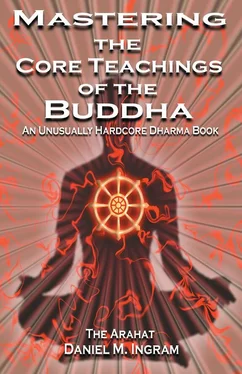Daniel Ingram - Mastering the Core Teachings of Buddha - An Unusually Hardcore Dharma Book
Здесь есть возможность читать онлайн «Daniel Ingram - Mastering the Core Teachings of Buddha - An Unusually Hardcore Dharma Book» весь текст электронной книги совершенно бесплатно (целиком полную версию без сокращений). В некоторых случаях можно слушать аудио, скачать через торрент в формате fb2 и присутствует краткое содержание. Год выпуска: 2009, ISBN: 2009, Издательство: Aeon Books, Жанр: Старинная литература, на русском языке. Описание произведения, (предисловие) а так же отзывы посетителей доступны на портале библиотеки ЛибКат.
- Название:Mastering the Core Teachings of Buddha - An Unusually Hardcore Dharma Book
- Автор:
- Издательство:Aeon Books
- Жанр:
- Год:2009
- ISBN:9781904658405
- Рейтинг книги:5 / 5. Голосов: 1
-
Избранное:Добавить в избранное
- Отзывы:
-
Ваша оценка:
- 100
- 1
- 2
- 3
- 4
- 5
Mastering the Core Teachings of Buddha - An Unusually Hardcore Dharma Book: краткое содержание, описание и аннотация
Предлагаем к чтению аннотацию, описание, краткое содержание или предисловие (зависит от того, что написал сам автор книги «Mastering the Core Teachings of Buddha - An Unusually Hardcore Dharma Book»). Если вы не нашли необходимую информацию о книге — напишите в комментариях, мы постараемся отыскать её.
Mastering the Core Teachings of Buddha - An Unusually Hardcore Dharma Book — читать онлайн бесплатно полную книгу (весь текст) целиком
Ниже представлен текст книги, разбитый по страницам. Система сохранения места последней прочитанной страницы, позволяет с удобством читать онлайн бесплатно книгу «Mastering the Core Teachings of Buddha - An Unusually Hardcore Dharma Book», без необходимости каждый раз заново искать на чём Вы остановились. Поставьте закладку, и сможете в любой момент перейти на страницу, на которой закончили чтение.
Интервал:
Закладка:
You are not free. Instead, you are floundering. Without discipline, without resolve, you are unlikely to be able to get past some of the difficult hurdles that stand between you and success in any of these trainings.
I have found it extremely valuable, particularly when sitting down to do formal meditation, to state to myself at the beginning of the session exactly what I am doing, what I hope to attain by it, and why attaining that is a good idea. I do this formally and clearly, either out loud or silently to myself. Having done practice with and without them, I have come to the definite conclusion that formal resolutions can make a huge difference in my practice. One of my favorite resolutions goes something like, “I resolve that for this hour I will consistently investigate 78
Practical Meditation Considerations
the sensations that make up reality so as to attain to liberating insights for the benefit of myself and all beings.”
Resolutions such as this one add a great deal of focus and
consciousness to my practice. They galvanize my energy, make plain my intentions, and also seem to work at some more subliminal or subconscious level to help keep me on track. I have also found that I can use resolutions in my daily life to good effect. For instance, when studying for a medical school exam, I might resolve, “For this hour, I will study this hematology syllabus so that I will increase my knowledge and skill as an aspiring doctor and thus be less likely to kill patients and more likely to help them.”
Such resolutions might seem overly formal or perhaps even goofy, and they sometimes seem this way to me, but I have come to appreciate them anyway. If I make resolutions that do not ring true, I can feel it when I say them, and this helps me understand my own path and heart.
If I am lost and wondering why I am doing what I am doing, these sorts of resolutions help me to consciously reconnect with what is important in life. I suggest that you try making these sorts of resolutions in your own life, at least so that you can see if they are useful for you. I am a big fan of formal resolutions, but you should see for yourself.
TEACHERS
There are many types of teachers out there from many traditions.
Some are very ordinary and some seem to radiate spirituality from every pore. Some are nice, some are indifferent, and some may seem like sergeants in boot camp. Some stress reliance on one’s own efforts, others stress reliance on the grace of the guru. Some are very available and accessible, and some may live far away, grant few interviews, or have so many students vying for their time that you may rarely get a chance to talk with them. Some seem to embody the highest ideals of the perfected spiritual life in their every waking moment, while others may have many noticeable quirks, faults and failings. Some live by rigid moral codes, while others may push the boundaries of social
conventions and mores. Some may be very old, and some may be very young. Some may require strict commitments and obedience, while others may hardly seem to care what we do at all. Some may advocate very specific practices, stating that their way is the only way or the best 79
Practical Meditation Considerations
way, while others may draw from many traditions or be open to your doing so. Some may point out our successes, while others may dwell on our failures.
Some may stress renunciation or even ordination into a monastic order, while others seem relentlessly engaged with “the world.” Some charge a bundle for their teachings, while others give theirs freely. Some like scholarship and the lingo of meditation, while others may never use or even openly despise these formal terms and conceptual frameworks.
Some teachers may be more like friends or equals that just want to help us learn something they happened to be good at, while others may be all into the hierarchy, status and role of being a teacher. Some teachers will speak openly about attainments, and some may not. Some teachers are remarkably predictable in their manner and teaching style, while others swing wide in strange and unpredictable ways. Some may seem very tranquil and mild mannered, while others may seem outrageous or rambunctious. Some may seem extremely humble and unimposing, while others may seem particularly arrogant and presumptuous. Some are charismatic, while others may be distinctly lacking in social skills.
Some may readily give us extensive advice, and some just listen and nod. Some seem the living embodiment of love, and others may piss us off on a regular basis. Some teachers may instantly click with us, while others just leave us cold. Some teachers may be willing to teach us, and some may not.
So far as I can tell, none of these are related in any way to their meditation ability or the depths of their understanding. That is, don’t judge a meditation teacher by their cover. What is important is that their style and personality inspire us to practice well, to live the life we want to live, to find what it is we wish to find, to understand what we wish to understand. Some of us may wander for a long time before we find a good fit. Some of us will turn to books for guidance, reading and practicing without the advantages or hassles of teachers. Some of us may seem to click with a practice or teacher, try to follow it for years and yet get nowhere. Others seem to fly regardless. One of the most interesting things about reality is that we get to test it out. One way or another, we will get to see what works for us and what doesn’t, what happens when 80
Practical Meditation Considerations
we do certain practices or follow the advice of certain teachers, as well as what happens when we don’t.
Another thing about teachers is that they only know what they know.
If we use the scopes of the Three Trainings to examine this, we may find that some teachers may have a good grasp of some of these scopes and not have a good grasp of the others. In fact, mastery in any area guarantees nothing about mastery of the others. It is worth being realistic about this fact, and so I will go on and on about this later.
Also, when we interact with teachers, we may wish to also consider which of their bodies of knowledge we wish to draw on, i.e. which of the Three Trainings we want help with. In fact, I think that it is very important to be clear about this explicitly, so that when we go in to talk with a teacher, we can ask questions from the correct conceptual framework and also fit their advice back into the correct framework. If we ask a teacher about how to attain to some high state and they mention tuning into boundless joy, and we then try to do this when driving to work and crash into the rear end of the car of some poor commuter, we have not followed their advice properly.
Similarly, we may wish to explicitly ask our teachers if they are skilled in the aspect of the specific training we are interested in mastering and also to what level. While you cannot always trust them to tell the truth, either through their own self-deception or the desire to fool you, if they do say something like, “No, I don’t know enough to speak on that level, as my own abilities are not that strong yet,” then at least you know to seek advice elsewhere. I have much more respect for a teacher who once told me that he didn’t feel qualified to teach me than for the numerous teachers who were not qualified to teach me who either didn’t realize this or tried to pretend otherwise.
Also, I would recommend making your goals for your life and
practice specific. For instance, you may wish to get a job as a dishwasher so that you can continue to feed yourself. You go to the meditation teacher and say, “I want to get a job as a dishwasher. Do you know how to do this?”
They may say, “Yes.”
Читать дальшеИнтервал:
Закладка:
Похожие книги на «Mastering the Core Teachings of Buddha - An Unusually Hardcore Dharma Book»
Представляем Вашему вниманию похожие книги на «Mastering the Core Teachings of Buddha - An Unusually Hardcore Dharma Book» списком для выбора. Мы отобрали схожую по названию и смыслу литературу в надежде предоставить читателям больше вариантов отыскать новые, интересные, ещё непрочитанные произведения.
Обсуждение, отзывы о книге «Mastering the Core Teachings of Buddha - An Unusually Hardcore Dharma Book» и просто собственные мнения читателей. Оставьте ваши комментарии, напишите, что Вы думаете о произведении, его смысле или главных героях. Укажите что конкретно понравилось, а что нет, и почему Вы так считаете.












